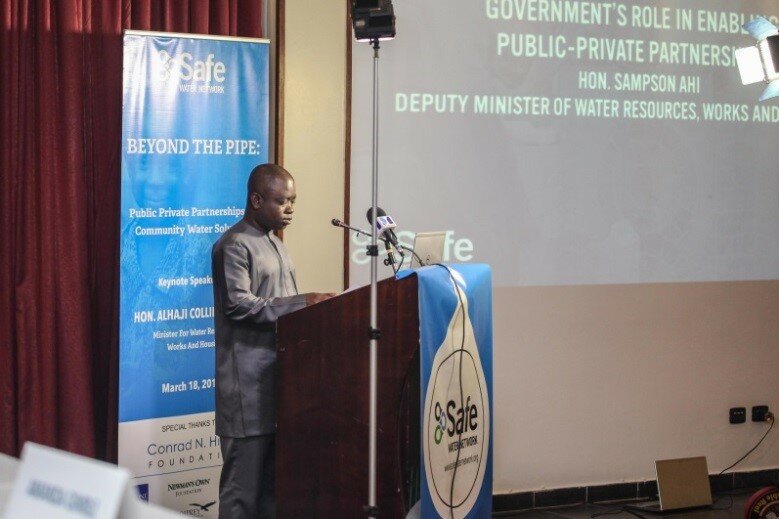The third annual Beyond the Pipe Ghana forum focused on the potential for public-private partnerships in community water systems. Ghana faces a funding gap in infrastructure development, a deficit which cannot be met by national budget allocations alone. The government has prioritized public-private partnerships (PPPs) to help address the gap, but private sector involvement in rural water provision has to date been insignificant. Safe Water Network presented preliminary analysis showing potential for PPPs to address an estimated 22% of the population in rural communities and small towns in Ghana.
The event builds on the 2014 forum which focused on pathways to sustainability in community water provision and resulted in the establishment of a PPP Working Group led by the Ministry of Finance to encourage a conducive policy environment for PPPs in the sector. “Beyond the Pipe: PPPs for Community Water Solutions” brought the idea of a partnership a step further with a clear way forward in developing an action plan for a pilot partnership. It also presented the policy recommendations resulting from the Ministry of Finance-led PPP Working Group.
 In his keynote address, Hon. Sampson Ahi, Deputy Minister of Water Resources, Works and Housing, stressed the Ministry’s commitment to the issue of sustainable water solutions and achieving universal access by 2025. “Much still needs to be done to address challenges and sustain success achieved,” stated the Deputy Minister, “and we must embrace partnerships, new approaches and new ways of operations.”
In his keynote address, Hon. Sampson Ahi, Deputy Minister of Water Resources, Works and Housing, stressed the Ministry’s commitment to the issue of sustainable water solutions and achieving universal access by 2025. “Much still needs to be done to address challenges and sustain success achieved,” stated the Deputy Minister, “and we must embrace partnerships, new approaches and new ways of operations.”
Charles Nimako, Ghana Country Director opened the day underscoring the objective of the forum — to advance the sector’s understanding of the conditions necessary for private sector engagement.
Kurt Soderlund, CEO, Safe Water Network, emphasized the importance of key stakeholders coming together to advance an agenda around sustainable partnerships that can have impact across Ghana and potentially W. Africa.
Safe Water Network’s Chief Financial Officer, Mark Owusu, presented a proposition for a partnership to develop a cluster, or group of proximate community water stations, in the Volta and Eastern regions. “Incentives for the private sector lie in expansion and improvement projects, and service and management contracts, while the public sector benefits from providing reliable, safe and affordable drinking water to community members.”
Mrs. Magdalene Apenteng, Director of the Public Investment Division at the Ministry of Finance and chair of the PPP Working Group, emphasized the role of the private sector in taking on risk. “If there is no risk, the government can do it if it has the resources, but high risk comes with high rewards.” She echoed the potential of a cluster-based approach in improving the economics of water stations and the importance of resolving challenges around setting efficient tariffs.
Fred Addae, Director of Water at the Ministry of Water Resources, Works & Housing added the importance of auditing, which is supposed to be conducted regularly, and touched on the importance of capacity development for District Assemblies and others involved in executing a PPP.
Ben Arthur, Executive Secretary of the Coalition of NGOs in Water and Sanitation, highlighted the importance of civil society in structuring and implementing PPPs. “We must create space for the community in partnerships,” he said. “People don’t mind paying if quality is good, but if tariffs reach a certain level, communities will revert to traditional sources.”.
Contributing to the discussion, David Kanyi, Coordinating Director of the South Dayi District, said that there are customers who can afford to pay in rural areas and that “after all is said and done, the most important components are transparency, trust and understanding.”
In addition to the Forum’s lead sponsor, the Conrad N. Hilton Foundation, other sponsors include Stone Family Foundation, Newman’s Own Foundation, KOSMOS Energy, Vitol Foundation, Osprey Foundation, and PepsiCo Foundation.
Related links:
2015 Ghana Beyond the Pipe Forum Welcome and Session Descriptions